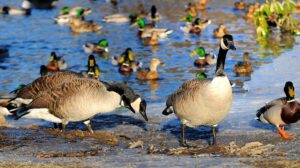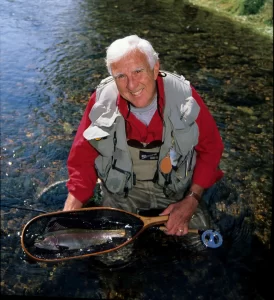Every 5 years, MassWildlife conducts a winter waterfowl survey of sites where people feed wild ducks and geese. While the feeding of wildlife is discouraged, there is no state law or regulation that prohibits feeding (though some municipalities do restrict or prohibit feeding). MassWildlife is asking for the public’s assistance to identify current waterfowl feeding locations so that biologists can visit and identify and count these birds.
The survey will be conducted statewide in January of 2023 and includes sites in urban, suburban, and rural areas near fresh, brackish, and salt water. Feeding sites range from municipal parks where many visitors come to feed the ducks to ducks gathering in backyards feeding on spilled bird seed or handouts thrown out someone’s back door.
MassWildlife biologists will visit historic feeding sites from January 9–27, 2023. Because feeding locations can change over 5 years, public input is needed. If you know of a spot where waterfowl are being fed, you are asked to let MassWildlife know by phone at 508-389-6321 or by e-mail at h.heusmann@mass.gov. Include the town and specific location where waterfowl are being fed. If you are able, also include the number of ducks and/or geese (preferably by species) that you see at the feeding site at one time.
Mallards are by far the most common duck at feeding sites, but other ducks may be observed as well. American black ducks and Canada geese are common, and wood ducks, pintails, gadwalls, American wigeon, and hooded mergansers are occasionally seen.
MassWildlife has been conducting the winter waterfowl survey for the past 50 years. A report summarizing this year’s survey results compared with previous years will be posted in the coming months.
Art contest connects youth artists to nature
There is still time to enter the Massachusetts Junior Duck Stamp (JDS) contest. Students from kindergarten through grade 12 can submit original artwork to participate in this fun and educational competition. The entry deadline is February 15, 2023. The process of creating these works of art allows students to appreciate the importance of preserving wetland habitats and the delights and diversity of wildlife. “Even if students do not enter the competition, science and art teachers will value the JDS curriculum as a useful resource,” advises MassWildlife’s Wildlife Education Coordinator, Pam Landry.
The JDS program links the study of wetlands and waterfowl conservation with the creation of original artwork. Students learn about the habitat requirements of various kinds of ducks and geese and then express their knowledge of the beauty, diversity, and interdependence of these species artistically, by creating a drawing or painting which can be submitted to the JDS art contest. The art is judged in four age group categories in a statewide competition; the entry judged Best of Show moves on to represent Massachusetts in the national JDS competition. Art teachers, science teachers, and parents who home-school can visit the MassWildlife web site for an information packet and entry information.
The Junior Duck Stamp is a pictorial stamp produced by the U.S. Fish and Wildlife Service to recognize the conservation efforts of students and support environmental and conservation education programs. Sold by the U.S. Postal Service and Amplex Corporation, the $5 stamp is purchased by birders, conservationists, wildlife art and stamp collectors, students, hunters, educators, etc. Funds generated are re-invested in the program to fund environmental education efforts, provide awards for the students, teachers, and schools that participate in the program, and market the JDS program.
For more information contact Pam Landry at pam.landry@mass.gov.
If there are any local winners, I will gladly include their duck stamp pictures in this column.
Feed Wild Birds Safely and Responsibly
The New York Dept. of Conservation (DEC) has advice for its NY residents which is also good advice for us here in the Berkshires:
For many birdwatchers, November 30 is an important date: the day that backyard bird feeders can go back up. To avoid conflicts with bears, DEC highly recommends only feeding birds from November 30 to April 1. There are many natural sources of winter food for birds including birch catkins, spruce and fir cones, dried seed heads from native grasses and flowers, and lingering fruits on plants. Bird feeders can supplement these natural foods and may attract more birds to your yard. A simple tube feeder with black oil sunflower seed is a great place to start. Depending on where you live, you might expect to see chickadees, nuthatches, juncos, and goldfinches. Adding suet is a sure bet to draw in woodpeckers. To provide a source of water, try installing a birdbath heater or bubbler and regularly refreshing the water.
If you are drawing wild birds into your yard with feeders, try these tips to keep birds safe:
- providing nearby cover such as evergreen trees, native shrubs, or even discarded Christmas trees;
- placing feeders away from windows and making windowpanes bird-safewith screens, netting, decals, or vertical tape;
- regularly cleaning feeders to avoid spreading disease;
- securely storing bird seed indoors;
- keeping cats indoors;
- feeding pets inside to avoid inadvertently attracting feral cats, rodents, or other wildlife; and
- taking down feeders in the spring to avoid bear conflicts.
Fishing and Hunting Swap Meet
The Cheshire Rod & Gun Club (CR&G) will be holding its third annual Fishing and Hunting Swap Meet on Saturday, January 28 at its clubhouse at 310 Curran Road, Cheshire. The hours are from 8:00am to 1:00pm. Open to the public, the admission cost is $3.00 for adults and kids 12 and under free.
It is an opportunity to buy, sell or trade new and used fishing and hunting gear. No guns, ammunition, household items; unsold items must be removed.
Table space is still available at $30, which includes admission for one. To reserve a table, contact Jeff Kruszyna at (413)743-4168.
Truckload of Goodies raffle winners
Staying with the Cheshire Rod & Gun Club, the winner of its Truckload of Goodies raffle was Melissa Fortini. 2nd place was John Haskins, 3rd was Bob Ciempa and 4th place was Tom Wiencek. Congratulations to all!
Author Dave Whitlock passed beyond the riverbend
One of the most important figures in the history of modern fly fishing passed away last Thanksgiving night.
“It breaks my heart to let you know that we lost Dave to a massive stroke,” wrote Dave’s wife Emily on their social media account. “He was working on his boat next to our casting pond when it hit, and he was flown to Tulsa, AZ for care. But he broke the tippet and drifted gently back to the deep water, the wild that he loved and spent a lifetime exploring, writing and painting about”.
Fly Fisherman magazine honored him by naming him one of four greats that make up the Mt. Rushmore of fly fishing. (The other three mentioned were Joe Brooks, Lee Wulff and Bernard “Lefty” Kreh). Fly Fisherman magazine editor Ross Purnell wrote “He was a brilliant trout angler, but he showed us that fly-fishing was about much more than trout. Because of him, we’ve had generations see the beauty in fly fishing for carp, bass, and panfish. He will be greatly missed.”
He was inducted into several Hall of Fames down through the years, including most recently, the International Game Fish Association’s Hall of Fame.
Dave’s art and writing appeared regularly in many fly-fishing and sport publications such as Fly Fisherman Magazine, Fly Fishing and Tying Journal, Trout Magazine and others. Besides them, he also authored or co-authored many flyfishing books. I suspect most fly fishermen have one or two of his books in their libraries.
Fly tying event coming up
After being relatively quiet, due to the Covid Pandemic, the Taconic Chapter of Trout Unlimited is getting active again. Starting off the new year, Berkshire Outfitters, on Grove Street in Adams, will be holding a Trout Unlimited Fly-tying event on Tuesday, January 24 at 6:00 pm. Beginners and experienced fly-tyers are welcome. Host Chris Samson will offer free lessons and loaner equipment for inexperienced tyers, as well as a good assortment of equipment and materials for purchase. It is open to the public but space is limited, so call Chris at Berkshire Outfitters at (413) 743-5900 to reserve your spot.
